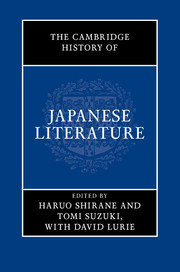Book contents
- The Cambridge History of Japanese Literature
- The Cambridge History of Japanese Literature
- Copyright page
- Contents
- Illustrations
- Contributors
- Book part
- A note on Romanization and conventions
- Glossary
- General introduction
- Part I The ancient period (beginnings to 794)
- Part II The Heian period (794–1185)
- Part III The medieval period (1185–1600)
- Part IV The Edo period (1600–1867)
- Part V The modern period (1868 to present)
- 56 Introduction: nation building, literary culture, and language
- 57 Kanshibun in the Meiji period and beyond
- 58 Translated fiction, political fiction
- 59 Newspaper serials in the late nineteenth century
- 60 Translation, vernacular style, and the Westernesque femme fatale in modern Japanese literature
- 61 The rise of modern women’s literature
- 62 Melodrama, family romance, and the novel at the turn of the century
- 63 Modern Japanese poetry to the 1910s
- 64 Between the Western and the traditional: Mori Ōgai, Nagai Kafū, and Tanizaki Jun’ichirō
- 65 Natsume Sōseki and the theory and practice of literature
- 66 A new era of women writers
- 67 Literary marketplace, politics, and history: 1900s–1940s
- 68 Canonization and popularization: anthologies and literary prizes
- 69 Colonialism, translation, literature: Takahama Kyoshi’s passage to Korea
- 70 Primitivism and imperial literature of Taiwan and the South Seas
- 71 From empire to nation: the spatial imaginary of the 1920s to early 1950s
- 72 Japanese literature and cinema from the 1910s to the 1950s
- 73 Modern drama
- 74 Modern poetry: 1910s to the postwar period
- 75 Trends in postwar literature, 1945–1970s
- 76 Women’s fiction in the postwar era
- 77 The emergence of girls’ manga and girls’ culture
- 78 Modern Japanese literature from Okinawa
- 79 Postwar Zainichi writings: politics, language, and identity
- 80 Contemporary Japanese fiction
- Bibliography of English secondary sources and translations
- Index
56 - Introduction: nation building, literary culture, and language
from Part V - The modern period (1868 to present)
Published online by Cambridge University Press: 05 January 2016
- The Cambridge History of Japanese Literature
- The Cambridge History of Japanese Literature
- Copyright page
- Contents
- Illustrations
- Contributors
- Book part
- A note on Romanization and conventions
- Glossary
- General introduction
- Part I The ancient period (beginnings to 794)
- Part II The Heian period (794–1185)
- Part III The medieval period (1185–1600)
- Part IV The Edo period (1600–1867)
- Part V The modern period (1868 to present)
- 56 Introduction: nation building, literary culture, and language
- 57 Kanshibun in the Meiji period and beyond
- 58 Translated fiction, political fiction
- 59 Newspaper serials in the late nineteenth century
- 60 Translation, vernacular style, and the Westernesque femme fatale in modern Japanese literature
- 61 The rise of modern women’s literature
- 62 Melodrama, family romance, and the novel at the turn of the century
- 63 Modern Japanese poetry to the 1910s
- 64 Between the Western and the traditional: Mori Ōgai, Nagai Kafū, and Tanizaki Jun’ichirō
- 65 Natsume Sōseki and the theory and practice of literature
- 66 A new era of women writers
- 67 Literary marketplace, politics, and history: 1900s–1940s
- 68 Canonization and popularization: anthologies and literary prizes
- 69 Colonialism, translation, literature: Takahama Kyoshi’s passage to Korea
- 70 Primitivism and imperial literature of Taiwan and the South Seas
- 71 From empire to nation: the spatial imaginary of the 1920s to early 1950s
- 72 Japanese literature and cinema from the 1910s to the 1950s
- 73 Modern drama
- 74 Modern poetry: 1910s to the postwar period
- 75 Trends in postwar literature, 1945–1970s
- 76 Women’s fiction in the postwar era
- 77 The emergence of girls’ manga and girls’ culture
- 78 Modern Japanese literature from Okinawa
- 79 Postwar Zainichi writings: politics, language, and identity
- 80 Contemporary Japanese fiction
- Bibliography of English secondary sources and translations
- Index
Summary
Keywords
- Type
- Chapter
- Information
- The Cambridge History of Japanese Literature , pp. 553 - 571Publisher: Cambridge University PressPrint publication year: 2015



